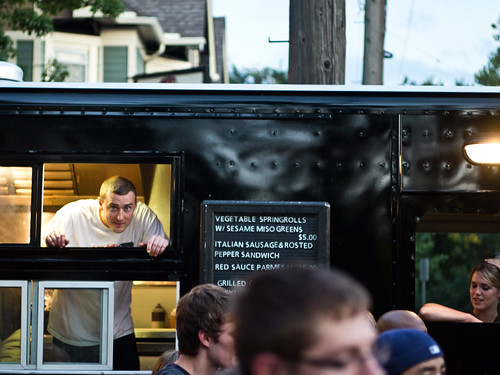8 Food Truck Mistakes to Avoid for a Successful Business
The food truck business doesn’t tolerate many mistakes. Of course, not everyone can find success in the mobile food industry, but you can help your business succeed by avoiding these common mistakes.
You Didn’t Take Health Code Requirements Seriously
No matter where you go, city and state governments will have rules that regulate the food truck industry. If you fail to obey these rules, then you could face heavy fines, not to mention a sharp decline in business. If you travel around the country, or even within your state, you could encounter a variety of requirements. Know those requirements before you make the trip. Otherwise, you will just waste gas and time.
You Didn’t Choose Your Partners Carefully
You have a vision for your food truck. That’s a huge first step, but you also need a partner that can help you meet that goal. Many people who invest in food trucks don’t realize how complicated the business can become. If you choose the wrong partner, then you might have to deal with personality conflicts, irresponsibility, and other problems that affects your business. When you’re competing against other food trucks, you have to know that you can rely on your partner. A lot of businesses fail because partners don’t see eye to eye.
You Don’t Realize How Much Time it Takes
It’s impossible to count the number of food truck businesses that die because their owners didn’t realize how much time their ventures would require. If you eat at food trucks, then you probably only see them for a few hours a day. It looks like easy work. Who wouldn’t want to earn a good living just by selling lunch to hungry crowds? Like many things, the food truck industry isn’t as easy as it looks. A lot of preparation happens behind the scenes. An owner might spend several hours chopping and mixing ingredients before loading up his truck. Those hours take a toll on the person’s life by interfering with other work and obligations. A food truck is a full-time job. If you’re not ready for that, then don’t get involved.
Owners Don’t Prepare for Winter
A food truck might make good money during the spring, summer, and fall, but what about winter? Winter often brings harsh weather that forces food truck businesses to shut down. Many businesses don’t even bother planning for winter because they know that it’s difficult and few people will spend money on their food. Unfortunately, some owners think that the summer season will last forever. Unless you live in one of the few areas that have warm weather throughout the year, it won’t. As temperatures chill, expect your profits to slow. If you trick yourself into thinking that the summer cash flow will last all year, then you’re in for a big surprise. Winters often bring lean times that you need to prepare for in advance.
You Don’t Have a Definitive Business Plan
Unless you have a second source of income, you can’t treat your food truck as a hobby. Like any other business, you need a plan that shows you how to progress towards your goals. Many people who want to start food trucks will need to borrow money from a bank of investor. That might sound like a pain, but it can actually help you because it forces you to write a business plan showing how you plan to generate profits and grow with the industry. Writing a business plan means more than just projecting future costs and revenue. You need to identify:
- Your team’s skills
- What niche you want to fill
- How much it will cost to start your business
- What relationships you can use to reach goals
- How much customers will actually pay for your food
These aren’t easy questions to answer. You’ll need to do a lot of research and thinking before you can convince someone to give you money. Even if you already have the capital, you should ask these questions. No one wants to lose money on a good idea.
There Isn’t Enough Money
Starting a food truck operation probably costs more than you think. Even after you spend a lot of money on the truck, equipment, and ingredients, you still have to pay for things like:
- Insurance
- Employees
- License fees
- Fuel
It doesn’t take long for your initial investment to run dry. Take a skeptical look at your business plan and look for reasons that you might need to spend more money than you expect. Research the industry, talk to local authorities, and visit other food truck owners. These strategies should help you determine how much money you really need for your first year and beyond.
Your Food Quality Varies

Image via Flickr by Edsel L.
Customers want to know that they will get a good meal every time they come to your food truck. If they have a bad experience once, then they might never come back. They don’t want to choke down a lunch they don’t like just because they’ve already spent money on it. You can’t blame them for that. You can address this issue by developing specific recipes for every dish on your menu. It shouldn’t matter that it’s Monday and Mark is working the grill. Your tacos (or hamburgers or pizza or whatever) should taste the same every time your customers visits you. You can insure steady food quality by making recipes and training your staff. Unfortunately, a lot of food truck owners lack the knowledge, resources, or experience to do this. If you can’t deliver restaurant-quality food every single day that you are open, then you shouldn’t start a food truck.
You Have Cheap Equipment
It’s hard to afford good equipment for a new food truck. Cheap equipment, however, breaks too often. That can mean that you spend more money in the long-run. Plus, broken equipment means that you can’t serve customers. If you’re not making money, you’re losing it. Invest in reliable equipment from the beginning so you make the most of your resources. Have you seen food truck owners make horrible mistakes that ruined their businesses? What advice would you give to the industry’s newcomers?
